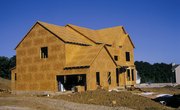
Appraising a rural property poses a number of particular challenges. There is no single definition of a "rural" property. Rather, appraisers look for a number of indicators to determine how to classify a home. They assess both your property and the community where your home is located to make the determination.
Tips
The definition of "rural" for a real estate appraisal considers numerous factors, including the size of your land, the location of your land, the use of your land and access to your land. Fannie Mae notes that these factors, among others, sometimes make classifying rural property a bit of a challenge.
Characteristics of a Rural Property
If the home is on a parcel of at least an acre, and more than 50 percent of the land is vacant, this indicates that your property is rural. Properties that supply their own heating source, water or septic systems are also more likely to be considered rural. Your property use matters, too -- if you farm or raise animals on your land, it may be considered rural. If getting to your property requires a dirt or private road, this is another indication that your property may be rural.
Qualifying Neighborhoods
A home's location may also indicate whether it's a rural property. For example, if a home is in a neighborhood that is less than 25 percent built-up, it may qualify as rural. If a neighborhood lacks amenities like sidewalks, storm sewers or street lights, this is an indication that the property is rural. Appraisers also look at the town or municipality where the home is located. If the population is under 5,000 people, and if there are no employment centers, commercial offerings or hospitals nearby, an appraiser might consider the property rural.
Choosing a Comparable Site
In some cases, your appraiser will use the sale price of a similar property to assess the value of your land. Because rural properties are often in sparsely populated communities, it can be tough to find a similar site with the same amenities. As a result, appraisers may choose sites that are a considerable distance away. They are looking for a site with similar characteristics, zoning and types of land use. Appraisers should indicate why they selected a particular property as a comparable in their assessment.
Choosing the Right Appraiser
If you are having your rural property appraised, look for an expert who has experience assessing rural and agricultural property. Additionally, look for an appraiser with experience assessing water quality, soil quality and crop potential. Your appraiser should also have a network of farmers and agribusiness practitioners that he can consult. Lastly, he should be well-versed in the Uniform Standards of Professional Appraisal Practice.
References
Writer Bio
John Louis is an award-winning journalist based in Washington, D.C. He attended Columbia University, where he was editor-in-chief of the "Columbia Spectator." He is currently studying law at Georgetown University.

